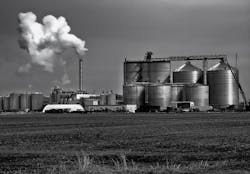Shortage of Carbon Dioxide Threatens Beer Production
In the midst of the COVID-19 (coronavirus) outbreak, the production of ethanol plants is decreasing, so the amount of carbon dioxide (CO2) they capture as a byproduct and resell is also going down.
Ethanol plants have either cut or stopped making ethanol and its byproducts, since fewer people are driving to work or traveling, reducing the need for fuels. Food and beverage manufacturers that depend on CO2 for carbonation are dealing with the repercussions, according to Forbes. The shortage of carbon dioxide is affecting beer, soda, seltzer and other businesses.
Reuters reported that ethanol production has decreased in the U.S., with 34 out of 45 plants affected by the current changes. Beer brewers are paying 25% more for carbon dioxide now, for example.
A coalition including: the Compressed Gas Association, National Pork Producers Council, Beer Institute, Brewers Association, National Turkey Federation, North American Meat Institute, National Cattlemen’s Beef Association and Renewable Fuels Association, wrote a letter to Vice President Mike Pence.
"Representing thousands of American workers across all 50 states that ensure the reliability of our Nation’s food supply, we write to express our strong concern that the current coronavirus pandemic creates a significant risk of a shortage in carbon dioxide that would significantly impact access to essential food and beverage supplies and other essential sectors of the U.S. economy," the coalition wrote.
The letter points out that carbon dioxide production has decreased by 20% in the U.S. and may continue to fall to 50% without interventions.
The Ames water treatment plant in Iowa, which uses carbon dioxide to soften hard water filled with minerals, is in danger, according to Ames water director John Dunn. Air Products, which provides CO2 to Ames and Des Moines Water Works, informed the plant in late March that the carbon dioxide supply was in danger.
To prevent a shortage, the Lincolnway Energy ethanol plant in Nevada reopened to supply carbon dioxide to Ames.
